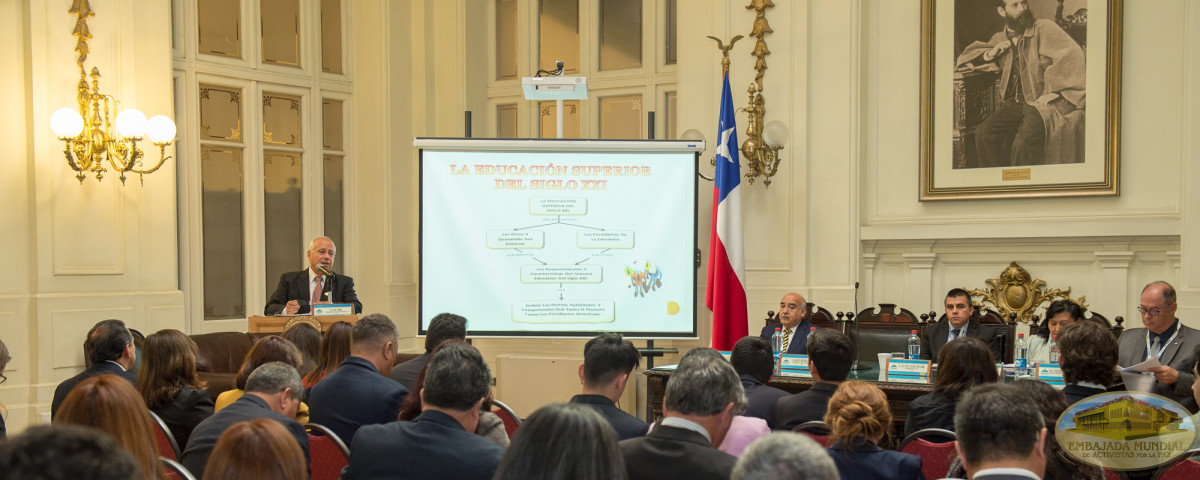The CUMIPAZ 2015 opens spaces for dialogue on the challenge of Higher Education in the XXI century
Professors formed the first table of the Educational Session
The first working table of the Educational Session CUMIPAZ Chile 2015, focused its analysis and proposals on the topic of "Higher Education and the Challenge of quality assurance in the development of professional competence in the twenty-first century."
The development of the topic was conducted by professors and teachers from different universities in Latin America, who, after exposing various themes, concluded that "Higher Education needs to, not only to form good professionals, but it is also necessary to form good citizens, to able to resolve their conflicts in a non-violent manner; and that is part of the challenge in the competencies of Higher Education."
In this sense, the table converges on the need for an ethical support in the educational process, not only based on pragmatic logic; but emphasizing that education, apart from being technical, should also form human values in individuals.
Another main point of this discussion was the need to promote Higher Education in the development of professional skills through comprehensive training, and encourage strategic interinstitutional alliances that promote and strengthen a culture of peace in society.
The Catholic University of Santa María UCSM (Peru), the University of Tolima (Colombia), the Autonomous University of Mexico UNAM, the National University of Cuyo and the University of Aconcagua (Argentina), and Santa Clara De Asis USCA University (Paraguay) were the institutions represented during this workshop, which was moderated by Dr. Tito Flores, an academic of the Technological Metropolitan University of Chile.
Education of ethical citizens
falseThe first speaker was Dr. Alberto Briceño Ortega, president of the UCSM, who spoke on the "Challenges of Higher Education in Human Development and Society."
Based on the World UNESCO Declaration (1998) on Higher Education, he presented an educational framework referenced in teaching values and emphasized that the concept of Higher Education should be based on human rights, democracy, respect for diversity in all its areas and peace; towards the construction of citizenship and the development of the country.
"Higher education should not only provide powers to the present and future world, but should also contribute towards the education of ethical citizens committed to the building of peace, the defense of human rights and democratic values," said Dr. Briceño.
Dichotomy in education
Dr. Luis Carlos Salinas Traslaviña, Director of the Observatory of Peace and Human Rights at the University of Tolima, spoke about a problem that affects Higher Education: the separation between theory and practice. In his speech, he said there is a gap between knowledge and action of the subject, "dichotomy is when the human being is one in which he says, even in what he thinks, but is another person in what he does".
Thus, he explained that education has to begin to seek a formation where the subject is responsible for himself; and peace, human rights and coexistence, is formed during daily life. He added: "What Higher Education is currently dealing with throughout the world, not only in Latin America, is the possibility of human existence."
Evaluate and rethink the education system
falseDr. Salvador del Toro, Secretary of the Organization of the Independent Association of Academic Personnel of the UNAM, in his speech, presented the topic "A State policy for Higher Education and Scientific Research", making reference to educational policies of the Mexican state.
He stressed the need to initially make a responsible assessment of the national education system, to clarify what has been achieved and determine what is needed. "We need to evaluate the orientation of our education, its quality, the necessary resources for its implementation, and specifically, in the ethical sense, the values we are transmitting to new generations," he said.
He added: "the principle to quality of education, is not in relation to the number of those who are educated, but in relation to teaching methods and systems, and in relation to the objectives and purposes of education."
Following that same thought, Dr. Gustavo Castiñeira de Dios, a professor at the National University of Cuyo and the University of Aconcagua, spoke of the need to continuously rethink the educational role as well as the renovation of curriculum designs.
"You cannot confine education to a single stage of life, it is necessary that it becomes an ever present element. It is also necessary to rethink the educational role, as a mere transmitting and informing instrument, and to prioritize a learning process, to completely learn values…, "said Dr. Castiñeira.
He also commented that it is not feasible to rely on syllabuses and curricular designs that are twenty years old, "it is important for the dynamics of this society, and the social knowledge of information, that the efforts to update curriculum designs be permanent,” he said.
The State guarantees education as a public good
falseTo conclude the presentations, the National Representative of Paraguay, Dr. Esmérita Sanchez Da Silva, Rector of the USCA, presented an analysis of the educational system in her country and among other points, she said:
"International experiences in the last three decades showed that education has contributed significantly in the human and economic development of various countries, who decided to invest the minimum percentage of their gross domestic product by 7%, which is recommended by UNESCO.”
In this regard, she noted that the issue of higher education is a fundamental foundation of every nation that wants genuine growth and development, she thus emphasized:
"The state must assume imperative and indelibly its role as regulator and guarantor of education as a public good. In this sense, it is necessary to develop a public, coherent policy on education in general and, particularily, on Higher Education."
The state must assume it’s imperative indelibly role as regulator and guarantor of education as a public good. In this sense, it is necessary to develop a public, coherent policy on education in general and in the field of higher education in particular.
